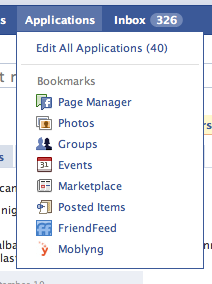
The company says that nearly a third of its 100 million monthly active users have already joined the new profile. Meanwhile, a series of protests groups have sprung up. The three largest ones that I’ve seen total 2.5 [Since I published a couple hours ago, the number has risen to 2.7] million users. You can check them out here, here and here.
[aditude-amp id="flyingcarpet" targeting='{"env":"staging","page_type":"article","post_id":97629,"post_type":"story","post_chan":"none","tags":null,"ai":false,"category":"none","all_categories":"business,","session":"D"}']What’s more, application developers are complaining because Facebook has taken away a “recently used applications” feature from the new site. Instead, users have to manually create their own set of bookmarked applications (see screenshot). More than 95 percent of users have installed applications — and many love them. So its weird to see Facebook making another move that potentially makes it harder for applications to be found. The redesign has already placed all applications into a “box” tab within the user profile page, whereas applications lived within the profile page on the old design.
[Update: On the developer front, Facebook has just introduced a new part of its interface where users can see the icons for applications in the lower left-hand side. It’s not done redesigning the new site, it says.]
AI Weekly
The must-read newsletter for AI and Big Data industry written by Khari Johnson, Kyle Wiggers, and Seth Colaner.
Included with VentureBeat Insider and VentureBeat VIP memberships.
While I’ve personally really liked the new profile — it helps me find interesting information faster, as it intends to do — I’ve also been concerned that this is not what most people care about. Most people seem to care about looking at profile pages, playing with apps, etc. As I wrote in June: “Is Facebook’s redesign aimed at Silicon Valley, not everywhere else?”
Facebook realizes that its long-term value lies in becoming an engaging social platform, because users will keep coming back to engage with applications and content. But that means Facebook actually has to observe and respond to what users want, versus its current modus operandi of telling them what they want. Facebook needs to facilitate development, heed user-feedback, and launch features based on that. That’s what Google does algorithmically with its search results, and after all, Facebook did at one point want to be the “next Google.”
But in spite of that aspiration, it seems that sometimes Facebook pays more attention to its publicity than user data, which is ironic since in doing so it is actually generating a lot of bad press.
This is illustrated with Great Apps, a status it bestows on its favorite third party applications. Facebook is treating the Platform as a publicity opportunity, highlighted with selecting Great Apps, which by and large exclude many of the most popular applications on the Platform. Popular applications are a reflection of what users want. Great Apps is just PR.
In sum, Facebook is once again betting that it knows best. That worked with the news feeds, which also saw massive protests when introduced in 2006. Betting big didn’t work with Beacon, though, an advertising feature that showed you what your friends were doing on other sites. After a loud, press-driven outcry, Facebook pulled back on the feature without even rolling it all the way out.
VentureBeat's mission is to be a digital town square for technical decision-makers to gain knowledge about transformative enterprise technology and transact. Learn More
